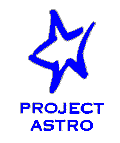
Project ASTRO San Diego Resources
Listed below are a number of resources to help our educators and
volunteers. We also have a growing number of "loaner" items, including
Sunspotter solar telescopes, so please contact us if you need any assistance.
Local Organizations:
- Project ASTRO San Diego: http://mintaka.sdsu.edu/projectastro/index.html
Continually updated with FAQ, workshop information, application
materials,
links to sample activities and national program information.
- San
Diego Astronomy Association (SDAA): www.sdaa.org
One of the country's largest
amateur astronomer groups. They have two programs of interest to
educators:
- Mars Society - San Diego Chapter: http://chapters.marssociety.org/SanDiego/
A very active local group committed to advancing the human exploration
of
Mars through mission simulations and public education. The San Diego
chapter will visit your school with a spacesuit and remote Mars Rover
demonstration.
- Planetaria:
The following locations offer planetarium shows for schools:
- San Diego Science Alliance (SDSA): http://www.sdsa.org.
Maintains a directory of educational resources (yes, Project ASTRO is in
there) and keeps a mailing list of interested teachers. Contact Pat
Winter: pat.winter@gat.com.
- Planetarium
and stargazing opportunities in San Diego County - this web page is
for college students but lists all upcoming public star parties and
planetarium shows.
- Palomar
Observatory
public information. You can also contact the Public Affairs
Coordinator,
Scott Kardell, at wsk@astro.caltech.edu.
- San Diego Science
Festival 2009
- Project ASTRO
and the CA Science Standards (by grade level) - listing the
astronomy, Earth-science, and space science standards by grade. Note
that many ASTRO activities are also great ways to address standards in
math and literacy. Please give us your examples and we'll include them.
California Curriculum Standards: http://www.cde.ca.gov/ci/
- listed by subject and grade in both printable (PDF) and online
formats, these should give volunteers an idea of the proficiency levels
and goals of their classroom students. It is often useful to look under
both Math and Science standards guidance before you plan an
activity. (Also remember that these standards are supposed to be met by
the end of the school year).
- Universe
at Your Fingertips (and More Universe...) - tables of contents and sample activities for download from
the Astronomical Society of the Pacific's Project ASTRO site.
- Project ASTRO San Diego 2008 Workshop Agenda, with activities listed and referenced to Universe at Your Fingertips, and a second page of "favorites" we did not have time to demonstrate.
- Current conditions of astronomical objects:
- How
High Can You Jump on other Worlds? (Activity C-12) Java applet for
"How High Can You Jump?" activity
- Solar System Sorting Activity: a new activity, and an
excellent lead-in to the discussion of Pluto as a planet, and for
introducing the various classes of objects in the solar system:
instructions and
key to pictures color pictures
- Lunar Crash Landing (I3/I4 and Family ASTRO): Elementary School version and Middle/High School/College
version
- Galaxy Sorting Activity (upgraded from Activity H7): Instructions and key to
pictures and galaxy cards (in color)
- Big Dipper Star Clock (Activity F3): Star Clock template and instructions
- Worlds in
Comparison:
- using Playdoh or clay to model the sizes of planets. At the 2009
workshop we used Crayola Air-Dry Clay (5lb, available from Michaels) and
cut it with round dental floss. Baby wipes are also handy for clay-covered
hands
at the end of this activity.
- Scale Models of the Solar System: (Activities D5-D7) http://www.exploratorium.edu/ronh/solar_system:
- an online tool allowing you to quickly
calculate distances for your customized scale model of the solar
system. A simpler version of the same idea can be found at: http://patriot.net/~jlazio/scale_model.html,
with the scale set by (1) the radius of
the Earth's orbit (1 A.U.) and (2) the diameter of the Earth.
- "The Reasons for the Seasons" kinesthetic astronomy
activity: http://www.spacescience.org/Education/ResourcesForEducators/CurriculumMaterials/Kin_Astro/1.html
This site has detailed
instructions and downloadable graphics. The activity enables kids to
use their own body movements to understand: the rising and setting of
the
sun, the changing night sky throughout the year, and the reasons for
the
seasons - "length of days, angle of rays, nothing to do with how far
aways"!
(For accounting reasons, you will need to "register" with this site to
download the activity, but they do not use the information for spam).
- Our place in the Universe:
Free stuff!
- Private
Universe survey and video
- AIAA
Educator Associate Program (look under "K-12 Educators")
- offers small grants ($250) to school education programs
promoting the use of
science and math in the classroom. Certainly worth applying for!
- Astronomical Society of the Pacific (ASP): http://www.astrosociety.org
The parent of Project ASTRO. Maintains and online educational catalog,
lists of useful websites, and publishes The Universe in the
Classroom
newsletter specifically for teachers of astronomy.
- The Space Place: http://spaceplace.jpl.nasa.gov
A one-stop child and teacher resource site at the Jet Propulsion
Laboratory,
Pasadena. Provides lesson guides online, and you may also order free
NASA
hardcopy materials (when available).
If you are covering a specific topic (e.g. Sun, Mars,
comets) and would like
hardcopy materials (calendars, beautiful posters, activities, CD-ROMS
etc),
you may contact: Dr. Nancy Leon at (818) 354-1067 or email: nancy.j.leon@jpl.nasa.gov
- and mention you
are a Project ASTRO San Diego partner. (Be aware though that
availability of
specific NASA items changes rapidly).
- The Nine Planets: http://seds.lpl.arizona.edu/billa/tnp
Facts, figures, and downloadable pictures of our
Solar
System
NASA also provides a comprehensive website for Solar System
Exploration: http://solarsystem.nasa.gov,
which
has current news and information on NASA missions to the planets and
their
discoveries.
- Astronomy Picture of the Day:
http://apod.nasa.gov/apod
Project ASTRO San Diego
